- Joined
- Jun 4, 2019
- Messages
- 4,561
- Reaction score
- 1,597
Hopefully these farmers take the money and run. They wanted war they got it. Let me starve and maybe this won’t happen again in the future

HARARE, Zimbabwe (AP) — When going shopping, the only thing Isaiah Macheku can budget for is shock.
Hyperinflation is changing prices so quickly in Zimbabwe that what you see displayed on a supermarket shelf might change by the time you reach the checkout.
“It is a nightmare,” Macheku said. “I can’t plan.”
Before a coup unseated the late president Robert Mugabe in late 2017, Macheku could afford all his family’s basics on his salary, which equals about $24. Now the same amount can hardly buy 4 kilograms (8.8 pounds) of beef.
He ended up buying chicken skin for his family’s supper. “I cannot afford the actual chicken,” he said. It is the closest his family gets to eating meat.
Zimbabwe now has the world’s second highest inflation after Venezuela, according to International Monetary Fund figures. The southern African nation went through this a decade ago but says there is no getting used to it, and coping has become both creative and desperate.
This time Zimbabwe’s economy has been on a downward spiral for more than a year as hopes fade that Mugabe’s successor and former deputy, President Emmerson Mnangagwa, will deliver on his promises of prosperity.
“Anyone who thinks a solution is in sight must be very brave,” said economist John Robertson in the capital, Harare. “Government officials don’t want to admit the real causes and don’t want to fix the real problems. People should brace for worse.” He said the real causes include the government spending beyond its means.
To shop, money alone is no longer enough. Calculators, mobile phones and notebooks have become necessary tools. In one sparsely attended groceries wholesaler, there were more people taking pictures of price stickers than those picking items from shelves.
“I sent the pictures to my husband. We have to decide fast before the prices go up again,” said one shopper, Marianne Hove. “He is in another supermarket sending me pictures of the prices there. We compare and decide which items to buy and from where.”
Others did quick calculations and called home to confirm items to buy.
In other shops, prices are only available at the checkout - and even then the cashier might stop a customer mid-payment to change prices.
Retailers said they would go out of business if they don’t adjust prices frequently.
“It is becoming increasingly impossible to appropriately price goods. The replacement value has been our Achilles heel,” said Denford Muntashu, president of the Confederation of Zimbabwe Retailers.
The situation is “synonymous with hyperinflation” even though the government statistics office has stopped publishing annual inflation data, Muntashu said.
Some businesses are closing while others are limiting their product range to reduce risk, he said.
Prices in Zimbabwe are changing faster than at any point in a decade. In 2009, the country’s currency collapsed under the weight of hyperinflation. The government then adopted a multi-currency system dominated by the dollar.
This year the government outlawed the use of foreign currencies, part of frequent and sometimes confusing changes to the country’s complicated monetary framework.
The local currency has been rapidly devaluing, “fostering high inflation, which reached almost 300 percent in August,” the IMF said after a review mission last month.
Weakening confidence, policy uncertainty and a continuation of foreign currency market distortions are exerting pressure on the exchange rate, the IMF added, while a severe drought and foreign debt hampering Zimbabwe’s access to external funding have impacted the economy hard.
Most businesses import products from abroad due to the collapse of local industry. Foreign currency shortages and rapid devaluation of the local currency are hard on both businesses and customers.
Zimbabwe’s president, Mnangagwa, continues to appeal for more time.
“Getting the economy working again from being dead will require time, patience, unity of purpose and perseverance,” he said in a state of the nation address on Oct. 1.
Like Mugabe, the president largely blames U.S. sanctions for the crisis, while the U.S. points out that the sanctions don’t target the government but selected officials, including Mnangagwa himself, over past alleged human rights abuses.
The patience of many Zimbabweans is wearing thin, considering the lengths they are going to cope.
“We cannot continue to live like this. Why did they remove Mugabe if they had no solutions?” said Harare resident Praise Sibanda.
“We are tired of 001,” she said, using the local slang for the growing trend of families resorting to a single meal a day.
Some innovative vendors have begun repackaging items such as cooking oil into sachets small enough to prepare a single meal.
According to the Consumer Council of Zimbabwe, people are increasingly using such sachets known as “tsaona,” a word in the local Shona language that means “accident.”
They adapted to the environment to survive, just like those way to the north.What did brown people ever do before their saviors came along???
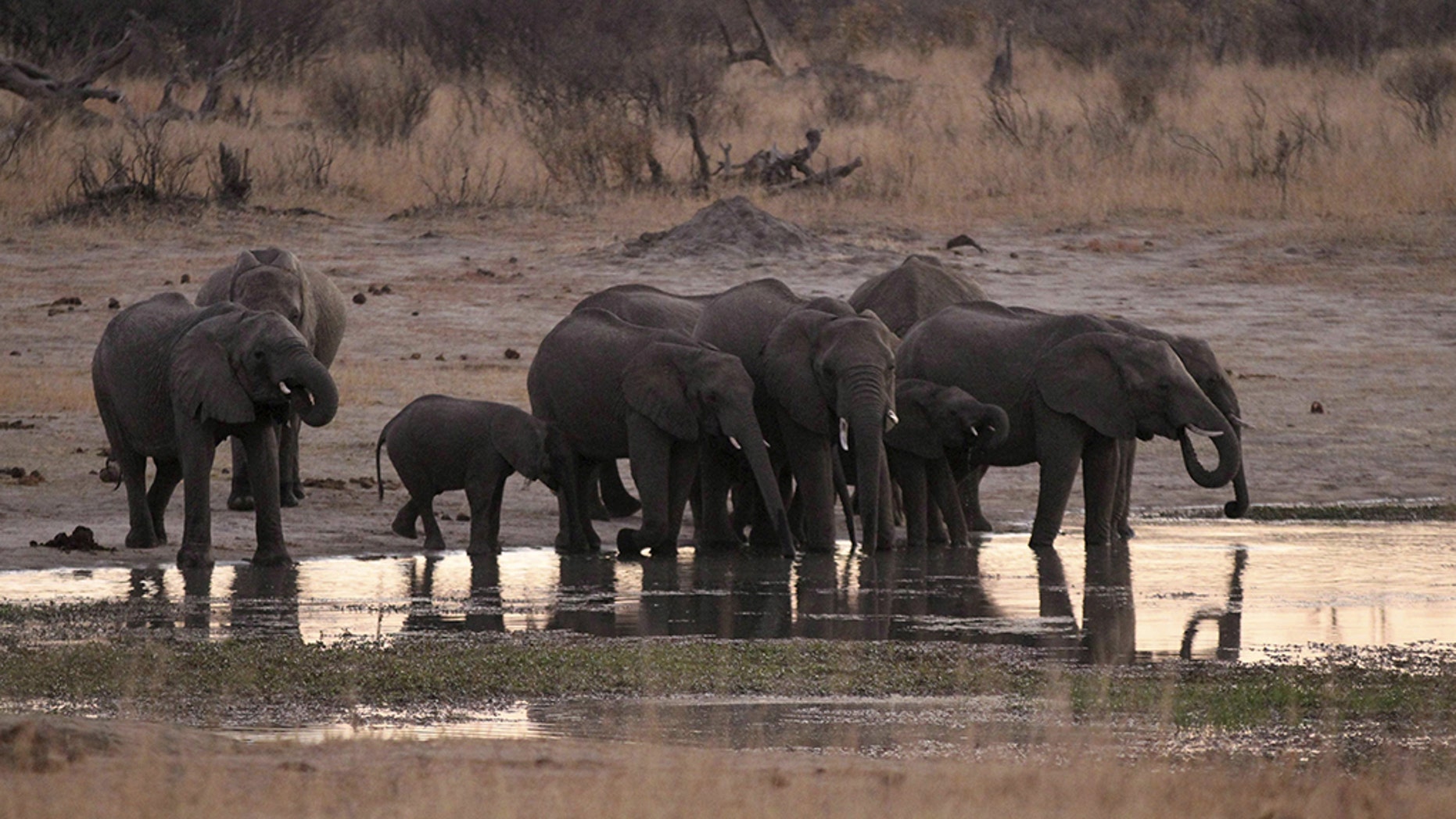
At least 55 elephants have starved to death since September in Zimbabwe’s biggest national park as the nation faces its worst drought in recent years, officials said Monday.
The carcasses were found near watering holes at the Hwange National Park, Zimparks spokesman Tinashe Farawo told Reuters. The lack of food and water forced the animals to travel great distances in search of something to eat or drink.
“The situation is dire,” Farawo said. “The elephants are dying from starvation and this is a big problem.”
Other animals such as lions at the park have also been affected.
The hungry and thirsty animals sometimes wander into villages, causing “massive destruction” to vegetation and have even killed people, Farawo said, adding that more than 20 people have been killed this year alone.
Zimbabwe has one of Africa's largest elephant populations, with overcrowding adding to the problems caused by the drought. The park can handle 15,000 elephants but currently has about 53,000, Farawo said.
"The single biggest threat to our animals now is loss of habitat," Farawo said. "We have managed to significantly reduce poaching ... we were losing hundreds of elephants in past years, but last year we only lost not more than 20 to poaching."
The park, which is not government funded, has been trying to drill more wells to make up for the ones that have dried up, but is lacking the money to do so, Farawo told Reuters.
Zimbabwe reportedly said it could earn revenue is by selling its $300 million ivory stockpile. However, the country failed to lobby the Convention on International Trade in Endangered Species to lift the ban on the ivory trade in August.
The drought comes as the southern African nation faces troubles from a collapsing economy that has resulted in massive food and water shortages to its population.
Before outside contact, Sub-Saharan Africans had not even developed written language or invented the wheel.I still don't get what the ordeal is. It's farming... fucking farming. There's machinery to manoeuvre and a certain amount of technical skill and know-how required, but it's not rocket science either. There's no reason black Zimbabweans can't do the jobs, especially when years have passed and replacements should have had plenty of time to receive training. I'm not saying it was right of them to push out their white countrymen, I just can't wrap my head around the logic of "We need the magical white people to come back again so our farms can work!" No... you just need to learn farming...
Sanctions aside, who the fuck is going to invest in Zimbabwe
And so Russia continues the Soviet tradition of keeping basket cases alive. I’m sure the Russian people are proud to know that Russia exerts influence over the mighty lands of Zimbabwe and the remains of what is Syria (not even the whole pie)Autocratic shitholes under sanctions gotta stick together:
https://allafrica.com/stories/201910260056.html
Not surprise the Russians went after their platinum and diamond mines, same strategy China use in Africa. Relatively easy return with plentiful cheap labor willing to do dangerous work for slave wage when the domestic currency is worthless.
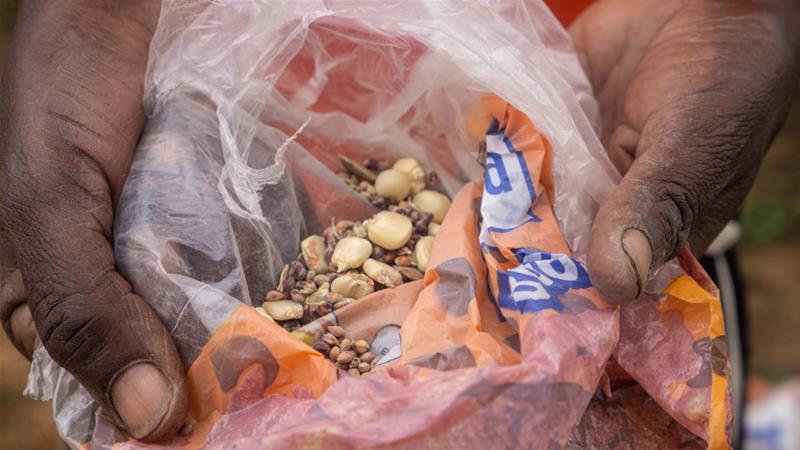
https://www.aljazeera.com/news/2019...babweans-struggling-cope-191206131610440.htmlBulawayo, Zimbabwe - Every morning, just before the daily power cut kicks in, Juliet Gumbo enters her kitchen to start preparing her meal. It will be her only food for the day, but she will have it hours later, when she returns to her electricity-lacking home after a day spent farming or hawking goods on the streets of Bulawayo, Zimbabwe's second-largest city.
Gumbo, a 52-year-old widow lacking a steady job, is just one of many Zimbabweans struggling to cope with a scorching drought and economic instability that have pushed millions to the brink of famine.
"I eat what I can get," Gumbo said.
Zimbabwe is in the grip of its worst economic crisis in 10 years, with inflation soaring to 300 percent and the population suffering fuel shortages, power rationing and currency woes. Emmerson Mnangagwa, who succeeded Robert Mugabe after a military intervention forced the longtime president to resign, has struggled to revive the economy while the long-standing financial troubles have been worsened by extreme weather shocks.
And now Zimbabwe is facing major food insecurity as many people do not have enough food to eat or they cannot afford it. According to Hilal Elver, the United Nations' special rapporteur on the right to food, the country is on the verge of "man-made starvation", with close to 60 percent of its 14-million population being food insecure.
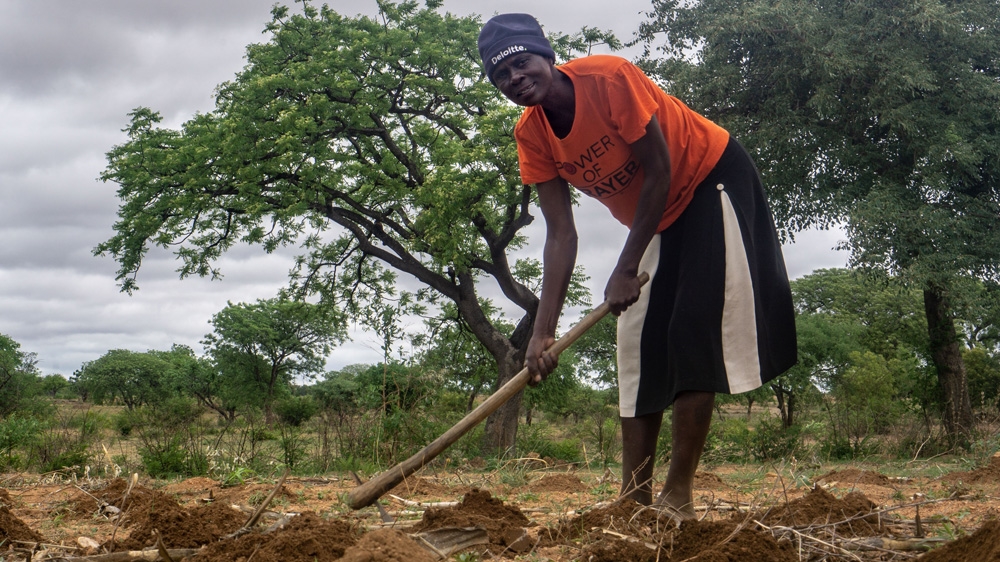
Juliet Gumbo is trying to plant her own food as she can no longer afford to buy maize
After an 11-day visit last month to areas hit by the El Nino-induced drought, Elver said the crisis affected a "staggering" 5.5 million people in rural areas and a further 2.2 million in cities.
"These are shocking figures," she said, adding that notwithstanding the devastating effect of recurrent droughts and powerful cyclones, the crisis was partly due to chronic economic mismanagement, high unemployment, widespread poverty and rampant corruption.
Sanctions and failed policies
In her statement, Elver also suggested economic sanctions by the United States and the European Union against officials and entities linked with the ruling ZANU-PF party over alleged abuses are contributing to Zimbabwe's current malaise.
The government in Harare also says sanctions are impeding economic growth and "hurting ordinary Zimbabweans" - but the US embassy refutes the claim.
"The government of Zimbabwe's failed economic policies, not sanctions, hinder Zimbabwe's economic growth," the embassy's press office said in a statement to Al Jazeera.
"Billions of dollars have been lost due to decades of corruption and harmful economic policies which have culminated in the current economic crisis. Implementation of economic and political reforms are the key to improving Zimbabwe's trajectory."
Analysts say years of shifting policies on land reform and food subsidies under Mugabe and Mnangagwa are also partly to blame for Zimbabwe's food scarcity.
The country's agro-based economy began to collapse following the state's violent seizure in the 2000s of an estimated 10 million hectares (25 million acres) for redistribution from white commercial farmers to resettle the landless black majority. Mugabe's government over the years resorted to price controls and money printing to tackle skyrocketing inflation and food shortages, but the measures impoverished local state-owned agricultural companies and contributed to the collapse of the local currency in 2009.
Although the removal of sanctions is a key demand of the post-Mugabe government's re-engagement with the West, the country is battling to stabilise its economy as it transitions from a decade of using the US dollar as part of its multiple currency system.
But the reintroduction of a local currency at the end of February and, more recently, the reversal of a decision to remove a government subsidy on maize have failed to ease the situation.
Last week, Finance Minister Mthuli Ncube said the government is making "perfect" efforts to reform the economy and attribute the larger part of the crisis to natural disasters and bad luck.
"Who gets a cyclone, and then another, then drought then power outages?" Ncube told reporters on Wednesday, referring to this year's farmland-ravaging Cyclone Idai and Cyclone Kenneth that followed it. "That is a classic example of being unlucky."
On Thursday, the government announced that the price of a 10kg (22 pounds) bag of maize meal selling for at least 105 Zimbabwean dollars ($6.32) would drop to 50 Zimbabwean dollars ($3.32).
But some consumers are doubtful if price controls will have any effect on escalating costs.
For Gumbo, her monthly state grant of 45 Zimbabwean dollars ($2.71) of her late husband's benefits is inadequate to meet her living needs. With the price of mealie meal - a staple food made from milled corn - beyond her reach, she opts to plant maize hoping that she will be able to yield a harvest in March that could help her to survive a further six months.
"I still can't afford it; today, they [the government] will say it's 50 Zimbabwean dollars but the price will still go up in the shops," said Gumbo, a sometimes seasonal farmer. "I'd rather plant and hope the rains will improve so I can have something to eat."
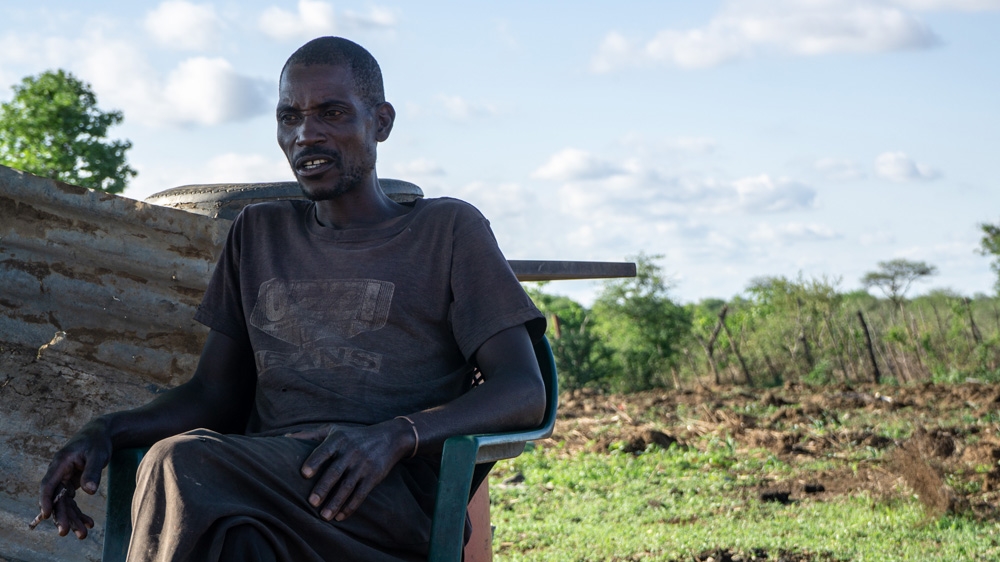
Farmer Sikhumbuzo Mlilo says he has been threatened with eviction by the government
Zimbabwe's food scarcity problems, however, are not recent. Once a regional breadbasket, the country over the past 10 years has been hit by rising food insecurity partly due to the fast-track land reform programme that saw a drop in agricultural production - mainly of dairy, beef and wheat.
While those who took over the white-owned farms have contributed significantly to the domestic consumption of corn, production remains insufficient to build up a store of grain reserves.
And now, even some of the resettled face eviction.
In the southern district of Umguza, an area 500km (311 miles) south of the capital, where some of the earliest resettlements took place, Sikhumbuzo Mlilo and his partner Buyiswa Moyo live on a plot apportioned from a white-owned commercial farm.
The pair, who have been farming the land since 2000, allege that in October they were issued with an eviction notice.
"We need to eat so we can survive, but if they tell us to leave this land after being here for so long, how do we plant our crops, where are supposed to go and find new land?" he told Al Jazeera.
The 44-year-old said the order made an already tough situation even worse for his farming-dependent family.
"Last [rainy] season we did not reap much from the harvest because the rains came late, so we've had to buy maize meal in town, but now it's so expensive it's hard for us," he added. "We just can't afford it."
Following the toppling of Mugabe after 37 years in power, Mnangagwa pledged to end eviction of white commercial farmers while maintaining there was no going back on land reform. Though seldom, eviction of white farmers still occurs while resettled black farmers who are not productive on their land have been warned of expulsion.
Mlilo denies underutilisation and suggests the plots of those threatened with expulsion could be earmarked for a larger farming project for "those with money and good government connections" - a fear also echoed by other resettled farmers.
Since the land seizures, Zimbabwe depends on production by subsistence farmers to provide the bulk of its maize needs, but local wheat production is inadequate.
As a result, the country suffers from a cereal deficit with current production falling short of 761,000 metric tonnes needed for 2019-20, according to regional statistics from the UN Office for Humanitarian Affairs. Cereals and pulses such as wheat and soya beans are largely imported but due to chronic shortages of foreign currency, the government has struggled to pay for importation which has resulted in periodic shortages of bread and cooking oil.
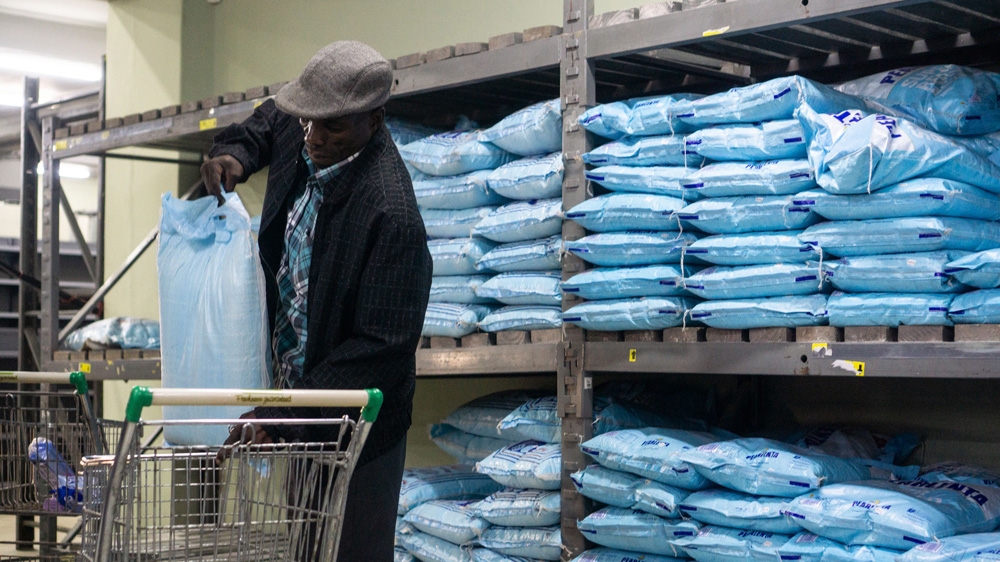
Government-approved prices for basic goods often do not match those in supermarkets
Meanwhile, over the past year, the price of bread has increased more than four times as bakers and millers struggle to keep pace with the quickly eroding value of the local currency against the US dollar.
Mangaliso Ndlovu, the former minister of trade and industry and current environment and tourism minister, acknowledged that inflation has drastically reduced the purchasing power of many Zimbabweans despite regular adjustments of civil servants' salaries.
"The wages have not been aligned to the exchange rate and that has been the major challenge which we are gradually addressing," he said.
"There is a challenge when it comes to food security and that is why we have put a flash appeal to the United Nations. When we talk of people going hungry we are literally talking about food on the table and this is a direct impact from the drought and this has stretched government's social protection programme."
In an effort to combat escalating prices, the government has launched the National Bakeries Programme, a series of community initiatives around the country where entrepreneurs use wood-fired ovens to make a cheaper version of bread.
The lower standard of homemade bread has not caught on, however, as the small bakeries struggle to produce enough to compete with bigger competitors.
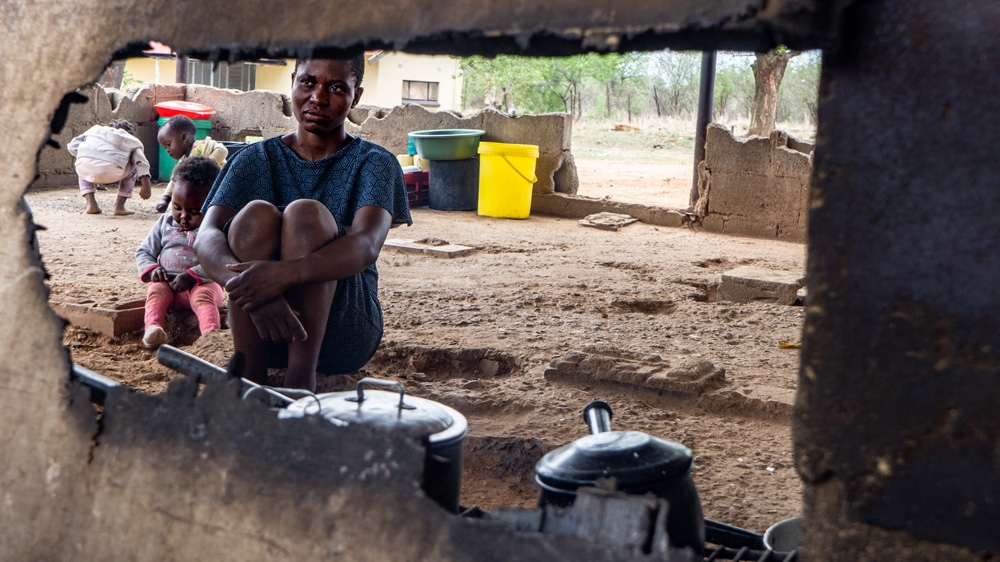
Instead of buying bread, Nokusila Ndlovu, 27, an unemployed mother of four who lives on the outskirts of Bulawayo has resorted to making vetkoeks, a regional version of doughnuts, on an open fire to feed her children.
"I can go without food the whole day, sometimes I eat one meal, but my children can't. So I have to find cheaper alternatives to bread. The price is just too much for me. So whenever I have money, I buy flour to make vetkoeks to keep them full," she said.
In an attempt to plug the nutritional gap faced by low-income households, the World Food Programme hopes to deliver more than 240,000 metric tonnes of essentials during the first half of 2020 - but the UN food agency faces a colossal task.
The WFP has appealed for nearly $300m to meet Zimbabwe's emergency needs, but less than 30 percent of funding has so far been guaranteed.
"Funds are required immediately for WFP to meet the growing needs of the hardest-hit Zimbabweans," it said in a statement.
Zimbabwe declares new public holiday to protest U.S sanctions on corrupted politicians and state companies
Byfarai Mutsaka, Associated Press | Oct 22, 2019
HARARE, Zimbabwe — Anti-Sanctions Day will be commemorated on Oct. 25, acting information minister Amon Murwira said Monday, calling it a chance to "further amplify the importance of this day to the economic emancipation and well-being of Zimbabwe."
Tens of thousands of people are expected to be bused to the capital, Harare, where they will march, watch a soccer match between the country's two biggest teams and attend an all-night concert.
Dozens of Zimbabwean officials, including President Emmerson Mnangagwa, have faced years of U.S. sanctions over alleged human rights violations amid troubled elections and the seizures of white-owned land.
Mnangagwa, who took office after longtime leader Robert Mugabe was forced out in late 2017, at first urged the country to "stop mourning" about the sanctions. But he has since turned them into a rallying cry like his predecessor and blamed them for the collapsing economy as hopes fade that he will revive the country's fortunes.
The U.S. says the sanctions are not against Zimbabwe's government at large and do not affect business between the countries. The U.S also says it is the biggest provider of humanitarian assistance to the southern African nation, whose 300% inflation is the second highest in the world after Venezuela's.
Zimbabwe has tried to rally regional countries to speak out against the sanctions and earlier this week even held a tearful anti-sanctions prayer meeting organized by the president's wife and attended by the president, his cabinet and dozens of others.
Some in the capital struggled to comprehend the rationale behind such events by a government that is failing to pay doctors and buy medicines, but they said they wouldn't mind the holiday.
"We march, watch soccer, eat, drink and dance the night away ... then what next?" asked Chengetedzo Mbundure, an office worker in Harare. "It is unnecessary but it is welcome. Who doesn't love a holiday?"
https://abcnews.go.com/Internationa...-public-holiday-protest-us-sanctions-66436832
Needs more wordsOn brink of 'man-made' starvation, Zimbabweans struggling to cope
Shifting policies on land reform and food subsidies by successive governments have contributed to the dire situation.
by Tendai Marima | 11 Dec 2019

Bulawayo, Zimbabwe - Every morning, just before the daily power cut kicks in, Juliet Gumbo enters her kitchen to start preparing her meal. It will be her only food for the day, but she will have it hours later, when she returns to her electricity-lacking home after a day spent farming or hawking goods on the streets of Bulawayo, Zimbabwe's second-largest city.
Gumbo, a 52-year-old widow lacking a steady job, is just one of many Zimbabweans struggling to cope with a scorching drought and economic instability that have pushed millions to the brink of famine.
"I eat what I can get," Gumbo said.
Zimbabwe is in the grip of its worst economic crisis in 10 years, with inflation soaring to 300 percent and the population suffering fuel shortages, power rationing and currency woes. Emmerson Mnangagwa, who succeeded Robert Mugabe after a military intervention forced the longtime president to resign, has struggled to revive the economy while the long-standing financial troubles have been worsened by extreme weather shocks.
And now Zimbabwe is facing major food insecurity as many people do not have enough food to eat or they cannot afford it. According to Hilal Elver, the United Nations' special rapporteur on the right to food, the country is on the verge of "man-made starvation", with close to 60 percent of its 14-million population being food insecure.

Juliet Gumbo is trying to plant her own food as she can no longer afford to buy maize
After an 11-day visit last month to areas hit by the El Nino-induced drought, Elver said the crisis affected a "staggering" 5.5 million people in rural areas and a further 2.2 million in cities.
"These are shocking figures," she said, adding that notwithstanding the devastating effect of recurrent droughts and powerful cyclones, the crisis was partly due to chronic economic mismanagement, high unemployment, widespread poverty and rampant corruption.
Sanctions and failed policies
In her statement, Elver also suggested economic sanctions by the United States and the European Union against officials and entities linked with the ruling ZANU-PF party over alleged abuses are contributing to Zimbabwe's current malaise.
The government in Harare also says sanctions are impeding economic growth and "hurting ordinary Zimbabweans" - but the US embassy refutes the claim.
"The government of Zimbabwe's failed economic policies, not sanctions, hinder Zimbabwe's economic growth," the embassy's press office said in a statement to Al Jazeera.
"Billions of dollars have been lost due to decades of corruption and harmful economic policies which have culminated in the current economic crisis. Implementation of economic and political reforms are the key to improving Zimbabwe's trajectory."
Analysts say years of shifting policies on land reform and food subsidies under Mugabe and Mnangagwa are also partly to blame for Zimbabwe's food scarcity.
The country's agro-based economy began to collapse following the state's violent seizure in the 2000s of an estimated 10 million hectares (25 million acres) for redistribution from white commercial farmers to resettle the landless black majority. Mugabe's government over the years resorted to price controls and money printing to tackle skyrocketing inflation and food shortages, but the measures impoverished local state-owned agricultural companies and contributed to the collapse of the local currency in 2009.
Although the removal of sanctions is a key demand of the post-Mugabe government's re-engagement with the West, the country is battling to stabilise its economy as it transitions from a decade of using the US dollar as part of its multiple currency system.
But the reintroduction of a local currency at the end of February and, more recently, the reversal of a decision to remove a government subsidy on maize have failed to ease the situation.
Last week, Finance Minister Mthuli Ncube said the government is making "perfect" efforts to reform the economy and attribute the larger part of the crisis to natural disasters and bad luck.
"Who gets a cyclone, and then another, then drought then power outages?" Ncube told reporters on Wednesday, referring to this year's farmland-ravaging Cyclone Idai and Cyclone Kenneth that followed it. "That is a classic example of being unlucky."
On Thursday, the government announced that the price of a 10kg (22 pounds) bag of maize meal selling for at least 105 Zimbabwean dollars ($6.32) would drop to 50 Zimbabwean dollars ($3.32).
But some consumers are doubtful if price controls will have any effect on escalating costs.
For Gumbo, her monthly state grant of 45 Zimbabwean dollars ($2.71) of her late husband's benefits is inadequate to meet her living needs. With the price of mealie meal - a staple food made from milled corn - beyond her reach, she opts to plant maize hoping that she will be able to yield a harvest in March that could help her to survive a further six months.
"I still can't afford it; today, they [the government] will say it's 50 Zimbabwean dollars but the price will still go up in the shops," said Gumbo, a sometimes seasonal farmer. "I'd rather plant and hope the rains will improve so I can have something to eat."

Farmer Sikhumbuzo Mlilo says he has been threatened with eviction by the government
Zimbabwe's food scarcity problems, however, are not recent. Once a regional breadbasket, the country over the past 10 years has been hit by rising food insecurity partly due to the fast-track land reform programme that saw a drop in agricultural production - mainly of dairy, beef and wheat.
While those who took over the white-owned farms have contributed significantly to the domestic consumption of corn, production remains insufficient to build up a store of grain reserves.
And now, even some of the resettled face eviction.
In the southern district of Umguza, an area 500km (311 miles) south of the capital, where some of the earliest resettlements took place, Sikhumbuzo Mlilo and his partner Buyiswa Moyo live on a plot apportioned from a white-owned commercial farm.
The pair, who have been farming the land since 2000, allege that in October they were issued with an eviction notice.
"We need to eat so we can survive, but if they tell us to leave this land after being here for so long, how do we plant our crops, where are supposed to go and find new land?" he told Al Jazeera.
The 44-year-old said the order made an already tough situation even worse for his farming-dependent family.
"Last [rainy] season we did not reap much from the harvest because the rains came late, so we've had to buy maize meal in town, but now it's so expensive it's hard for us," he added. "We just can't afford it."
Following the toppling of Mugabe after 37 years in power, Mnangagwa pledged to end eviction of white commercial farmers while maintaining there was no going back on land reform. Though seldom, eviction of white farmers still occurs while resettled black farmers who are not productive on their land have been warned of expulsion.
Mlilo denies underutilisation and suggests the plots of those threatened with expulsion could be earmarked for a larger farming project for "those with money and good government connections" - a fear also echoed by other resettled farmers.
Since the land seizures, Zimbabwe depends on production by subsistence farmers to provide the bulk of its maize needs, but local wheat production is inadequate.
As a result, the country suffers from a cereal deficit with current production falling short of 761,000 metric tonnes needed for 2019-20, according to regional statistics from the UN Office for Humanitarian Affairs. Cereals and pulses such as wheat and soya beans are largely imported but due to chronic shortages of foreign currency, the government has struggled to pay for importation which has resulted in periodic shortages of bread and cooking oil.

Government-approved prices for basic goods often do not match those in supermarkets
Meanwhile, over the past year, the price of bread has increased more than four times as bakers and millers struggle to keep pace with the quickly eroding value of the local currency against the US dollar.
Mangaliso Ndlovu, the former minister of trade and industry and current environment and tourism minister, acknowledged that inflation has drastically reduced the purchasing power of many Zimbabweans despite regular adjustments of civil servants' salaries.
"The wages have not been aligned to the exchange rate and that has been the major challenge which we are gradually addressing," he said.
"There is a challenge when it comes to food security and that is why we have put a flash appeal to the United Nations. When we talk of people going hungry we are literally talking about food on the table and this is a direct impact from the drought and this has stretched government's social protection programme."
In an effort to combat escalating prices, the government has launched the National Bakeries Programme, a series of community initiatives around the country where entrepreneurs use wood-fired ovens to make a cheaper version of bread.
The lower standard of homemade bread has not caught on, however, as the small bakeries struggle to produce enough to compete with bigger competitors.

Instead of buying bread, Nokusila Ndlovu, 27, an unemployed mother of four who lives on the outskirts of Bulawayo has resorted to making vetkoeks, a regional version of doughnuts, on an open fire to feed her children.
"I can go without food the whole day, sometimes I eat one meal, but my children can't. So I have to find cheaper alternatives to bread. The price is just too much for me. So whenever I have money, I buy flour to make vetkoeks to keep them full," she said.
In an attempt to plug the nutritional gap faced by low-income households, the World Food Programme hopes to deliver more than 240,000 metric tonnes of essentials during the first half of 2020 - but the UN food agency faces a colossal task.
The WFP has appealed for nearly $300m to meet Zimbabwe's emergency needs, but less than 30 percent of funding has so far been guaranteed.
"Funds are required immediately for WFP to meet the growing needs of the hardest-hit Zimbabweans," it said in a statement.
https://www.aljazeera.com/news/2019...babweans-struggling-cope-191206131610440.html
Thread Index:
- On brink of 'man-made' starvation, Zimbabweans struggling to cope (Dec 11, 2019)
- Zimbabwe's farmers look back at 'hell' under Mugabe (Sept 12, 2019)
- Mugabe's farm seizures: racial justice or catastrophic power grab? (Sept 6, 2019)
- In Zimbabwe, An Economic Crisis With 175% Inflation Drives Discontent (August 19, 2019)
- Protests highlight failure of post-Mugabe leadership to reform Zimbabwe (August 14, 2019)
- Lessons from Zimbabwe's failed land reforms
- Zimbabwe's white farmers: Who will pay compensation? (May 16, 2019)
- Zimbabwe pays $64m to white farmers who lost land under Mugabe (May 16, 2019)
- Evicted farmers in Zimbabwe to receive government compensation (May 6, 2019)
- Zimbabwe appeals for UK support to compensate white farmers (April 16, 2019)
- Once Evicted White Zimbabwean Farmer Returns to His Land
- Zimbabwe's exiled White farmers urged to return home as agricultural industry struggles
Zimbabwe's exiled White farmers urged to return home as agricultural industry struggles
By Africa correspondent Sally Sara | 3 Feb 2018
The Zimbabwean Government's message to exiled farmers is clear. Come home.
It is offering land leases to commercial farmers in an effort to re-start the nation's agricultural industry.
Basil Nyabadza from Zimbabwe's Agricultural and Rural and Development Authority says Zimbabwean farmers in Australia should return to home soil.
"We have a lot of capital resource dotted around the world, including Australia," Mr Nyabadza said.
The Government is now offering 99-year leases to white farmers, a deal previously reserved for black Zimbabweans.
The resignation of president Robert Mugabe last November and the swearing in of his successor Emmerson Mnangagwa has delivered significant change.
Government officials now admit the campaign of farm invasions that began in 2000 was a mistake.
"Clearly, the formulas deployed then, left a lot of bad feeling. And more importantly, the intellectual property, left our borders," Mr Nyabadza said.
Thousands of white farmers were forced off the land during the invasions.
Several farmers and farm workers were killed, many others were injured.
The Zimbabwean Government promised the program would redistribute farming land to Zimbabweans in need.
But many farms were taken by politicians and members of the ZANU-PF ruling party.
Agricultural production dropped dramatically and the nation once regarded as the bread basket of Africa struggled to feed itself.
The farm invasions have continued over the last 18 years and Mr Mnangagwa was part of the government which allowed the seizures to continue.
Now farmers who lost everything are being asked to take the latest announcement in good faith.
For some former landholders, that is too much to ask. They will never return. Others are prepared to give it a try.
Mr Nyabadza says public/private partnerships are the only way forward to restore trust.
"We are now in a new dispensation. And the challenge is now, we must rebuild our economy. In so doing, we need each other. So, we are reaching out," Mr Nyabadza said.
http://www.abc.net.au/news/2018-02-03/zimbabwes-exiled-farmers-urged-to-return/9392322
Needs more words
